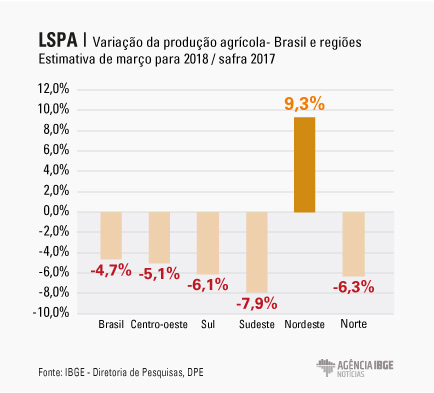Agricultural production
Northeast, only region expecting a harvest increase in 2018
April 10, 2018 09h00 AM | Last Updated: June 05, 2018 10h59 AM
Having an agricultural production estimated at 17.8 million tonnes for 2018, 9.3% bigger than in 2017, the Northeast is the only region in Brazil where it is expected to harvest more than last year. The data came from the Systematic Survey of Agricultural Production related to March, released today by the IBGE.
The national forecast for 2018 was of 229.3 million tonnes, 4.7% less than in 2017, though above the February estimate (-5.6%). In the other regions, the drops were: Central-West (-5.1%), South (-6.1%), Southeast (-7.9%) and North (-6.3%).

Area known as Matopiba helps leveraging results
Compared with the February estimate, the increases in the harvest of cotton stood out in the Northeast, having registered 10.5% in Bahia, and the production of soybeans recorded 8.5% in Bahia, 4.9% in Piauí and 3.4% in Maranhão.
"In contrast with the drought that affected the region over the last years, the volume of rainfall this year has been benefiting the development of the crops, mainly in the Matopiba region, comprising Maranhão, Tocantins. Piauí and Bahia", highlights Carlos Antônio Barradas, manager of the survey.
In spite of the positive forecast in the Northeast, this region is the second smallest agricultural producer in Brazil, accounting for 8.5% of the national harvest, ahead only of the North (3.6%). While the Central-West, South and Southeast accounted for 43.9%, 34.4% and 9.6%, respectively.
Drops in soybeans, corn and rice cause decrease in March forecast
In the March estimate for the national harvest, the drop in relation to the agricultural production in 2017 was caused by the the reductions of -0.4% in soybeans, -12.4% in corn and -5.5% in rice, since these three crops account for 93.1% of the Brazilian harvest.
Even with the drops, Barradas remained optimistic regarding the future results. "This year has been quite positive for agriculture, but rainfall arrived later than last year. Persisting the favorable weather, however, the production can even surpass the record in 2017", says him.




















